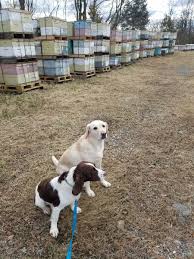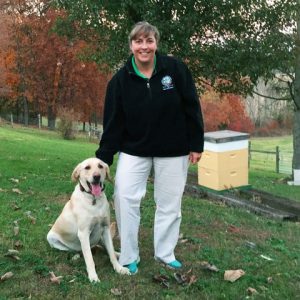 Cybil Preston, State Apiary Inspector, MDA
Cybil Preston, State Apiary Inspector, MDA
Phone 410-841-5920, Fax 841-5835, Cell 410-562-3464
The Summer/Fall Drought was brutal. Colonies of bees cruised right through their stores or were not able to gather a fall goldenrod or fall aster flow because the plants were struggling in to the extremely dry weather.
Fall Crashes
I am again seeing a large number of "Fall Crash or "Fall Dwindle:" mostly seeing poor or spotty brood patterns. Pupae are being removed or partial removal in large numbers, and there is a lack of nurse bees. We are actually seeing deformed wings and also varroa on workers as they emerge from cells!
If you are treating for varroa mites, please do a mite count prior to and after use of your varroa control. Many beekeepers throughout the region have questions floating concerning the efficacy of some of the varroa controls. This pre-count and after-count should show that your varroa control worked or that it didn't! However, if you have a very strong colony and they are robbing weaker colonies (especially during this terrible Fall drought), they are also bringing back varroa from robbing out the weaker colony.
Another thing to check for is the brood pattern before and after the varroa treatment. Check to make sure the queen is laying after you treat for mites. After removal of your varroa treatment, check for eggs and young larvae to ensure that your colony is still queenright.
Also please check the best use dates on your products make sure your product has not expired: old product can be either too weak or too harsh for your application, adding risks for your bees! Also make sure you use it properly. Misuse of a control is part of this problem also.
Other pests
Yellow Jackets and European hornets are plaguing beekeepers' hives, and more than a handful of calls have come from non-beekeepers, also.
Make sure to reduce your entrances especially if you are feeding.
Field Watch/Bee Check and Survey
This Voluntary beehive mapping tool is going strong. There are more beekeepers registered than any other crop.
Thank you to all the beekeepers that participated in the National Honey Bee Survey. We sampled 14 sites singly and 5 sites received dual sampling. I appreciate your willingness to participate.
 Mack & Tukka
Mack & Tukka
Maryland's AFB dogs will be back into their inspection routine soon. We will work on commercial beekeepers moving to California first.
No Canada Queens
Due to Canada's importation of honey bees from Denmark, Chile, and Australia, the USDA has closed the border to any queen bees coming into the United States. USDA hopes to negotiate a new export certificate by the 1st of the year.
Bees across state lines
If you are purchasing bees from another state please make sure they are inspected from the state of origin before shipping! The Maryland Department of Agriculture must receive the Inspection report and permit from the state of origin before the bees are shipped into Maryland.
This rule applies to both Nucleus colonies and packaged bees. Packaged bees usually have a general blanket inspection permit in order the we mayknow where imported bees are coming from.
Maryland Nuc Producers, Take Note!
If you are planning on selling nucleus colonies in the spring. It is your job to have them inspected for out-of-state sales. It is the beekeeper/sellers job to know whether the hive will be crossing state lines. Don't wait until the last minute: notify your inspector early.
